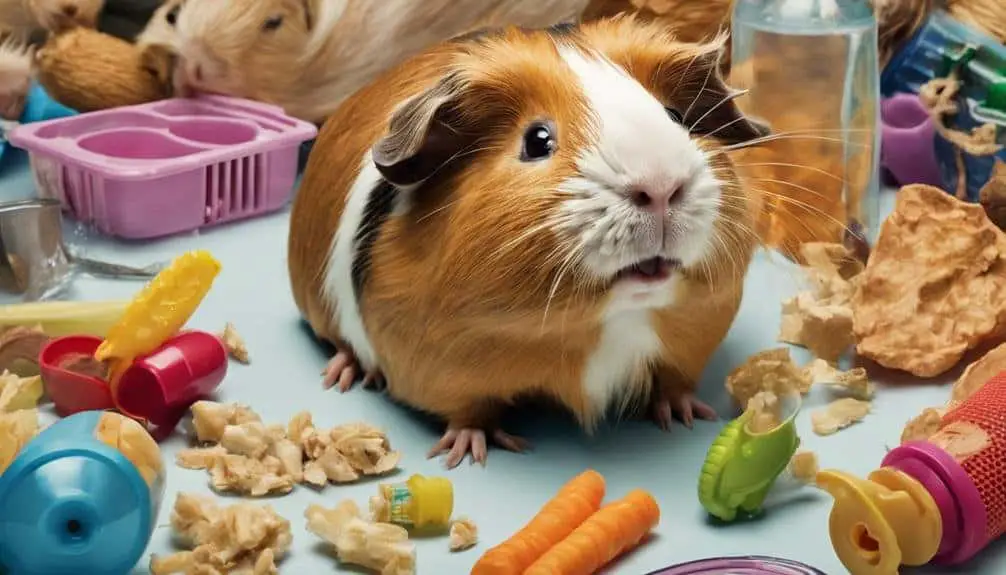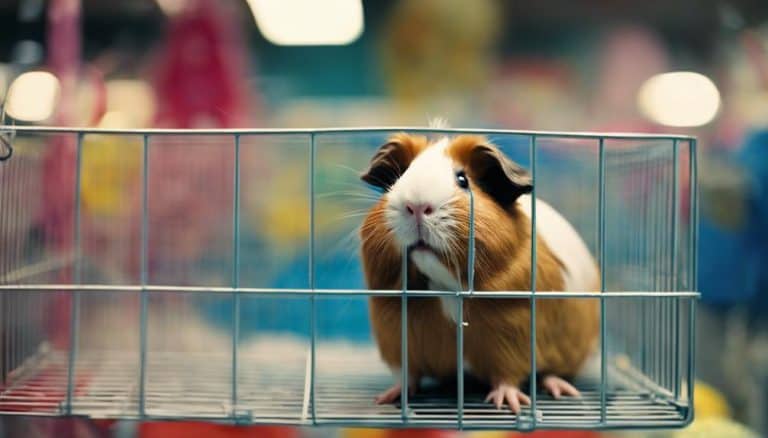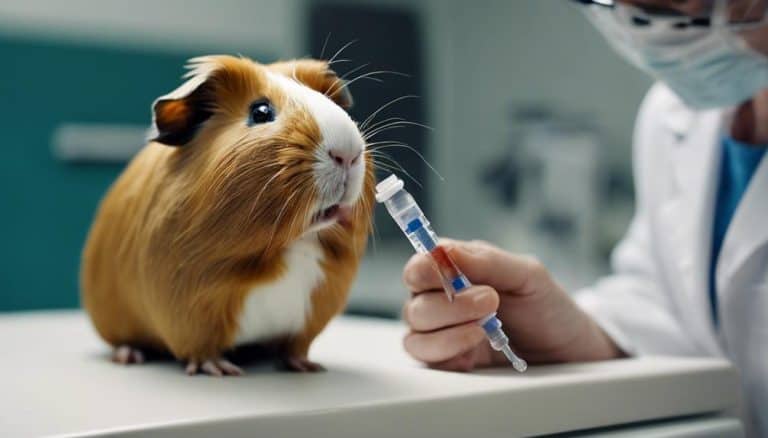10 Reasons Why Guinea Pigs Squeak
As pet owners, we might sometimes dismiss guinea pig squeaks as just noise, attributing it to their playful nature or occasional hunger. However, delving into the 10 reasons why these adorable creatures make such sounds can reveal a deeper level of communication that we may be overlooking.
Understanding the nuances behind their squeaks can provide valuable insights into their well-being and emotions, ultimately strengthening the bond between us and our furry companions. Let’s explore the intricacies of guinea pig squeaks and what they might be trying to convey to us.
Social Interaction
When observing guinea pig social interactions, it becomes evident that squeaking serves as a vital form of communication among these small rodents. Guinea pigs use squeaks to express a wide range of emotions and intentions during social interactions with their fellow companions. These vocalizations can indicate excitement, happiness, or a desire for attention from their group members.
Squeaking plays a crucial role in bonding and establishing connections within a guinea pig community. It helps in maintaining social harmony and cohesion among the group members. Whether it’s during playtime, grooming sessions, or exploring their environment together, guinea pigs often vocalize through squeaks to convey their feelings and needs to others.
Understanding the context and nuances of these squeaks can provide valuable insights into guinea pig social dynamics and relationships. By paying attention to their vocalizations during social interactions, guinea pig owners can better interpret their pets’ behavior and respond to their social needs effectively.
Hunger and Thirst
In guinea pig social interactions, hunger and thirst play a significant role. These small rodents may vocalize their need for food or water through squeaks. Guinea pigs often squeak when they’re hungry or thirsty, using this sound as a way to communicate their need for sustenance. It’s a common behavior for guinea pigs to express their desire for food through vocalizations, especially when they lack access to hay, vegetables, or pellets.
To prevent excessive squeaking due to hunger or thirst, it’s essential to provide guinea pigs with a balanced diet and access to fresh water at all times. Monitoring their food intake and establishing regular feeding schedules can also help reduce hunger-related squeaks. By meeting their nutritional needs consistently, we can ensure that guinea pigs are content and less likely to vocalize their hunger or thirst.
Pain or Discomfort

When guinea pigs are in pain or discomfort, they may squeak to communicate their distress. This can be a sign that they need immediate attention, as it could indicate injuries, illnesses, or dental problems.
Monitoring their behavior and vocalizations closely can help identify signs of discomfort and ensure prompt veterinary care is sought.
Signs of Distress
Experiencing distress, guinea pigs may emit squeaks as a crucial form of communication, signaling potential pain or discomfort. Sudden or continuous squeaking in guinea pigs can be a sign of distress, often stemming from injuries, illnesses, or uncomfortable surroundings. It’s vital to promptly identify the underlying cause of distress behind the squeaks to ensure the well-being of your pet.
Common reasons for distress-related squeaking in guinea pigs include urinary issues, dental problems, or social conflicts. By closely monitoring your guinea pig’s squeaking patterns, you can proactively recognize signs of distress early on and take necessary actions, such as seeking veterinary care. Understanding these signs can help create a healthier and happier environment for your guinea pig.
Health Issues
Amidst various health issues that can afflict guinea pigs, squeaking may serve as a vital indicator of pain or discomfort stemming from conditions like dental problems, urinary issues, or infections. Pigs use squeaking to communicate distress, especially when experiencing respiratory infections, mites, or bladder stones.
Monitoring the frequency and intensity of these squeaks is crucial in identifying underlying health issues promptly. Sudden or continuous squeaking should raise concerns as it could signal significant discomfort in guinea pigs. If squeaking persists or is accompanied by other worrying symptoms, seeking prompt veterinary care is essential to address potential health issues effectively.
Being attentive to these vocal cues can aid in maintaining the well-being of our furry companions.
Environmental Factors
In considering the factors that can contribute to guinea pigs expressing pain or discomfort, it’s essential to acknowledge the impact of their environment on their well-being. Guinea pigs often squeak as a response to discomfort caused by their surroundings. Improper cage conditions, such as insufficient bedding, extreme temperatures, or a lack of hiding spots, can lead to squeaking.
Stressful environments, characterized by loud noises, frequent disturbances, or overcrowding, may also trigger squeaking in guinea pigs. Furthermore, sudden changes in diet or the introduction of new foods that upset their stomachs can result in squeaking due to digestive discomfort.
Additionally, the absence of social interaction or companionship can often make guinea pigs squeak, as they’re social animals that thrive on companionship.
Excitement and Happiness

When guinea pigs are excited or happy, they often express their emotions through high-pitched squeaks that are a clear indication of their joy and eagerness. These vocalizations play a significant role in understanding and interpreting the emotional state of our guinea pig companions.
Here are some key points to consider regarding guinea pig noises:
- Anticipation of Playtime: Guinea pigs may squeak with excitement when they anticipate playtime, eagerly awaiting interactions with toys or engaging activities.
- Desire for Treats: Squeaks of happiness can also occur when guinea pigs anticipate treats, expressing their delight at the prospect of tasty snacks.
- Interaction with Owners: When bonding with their owners, guinea pigs may squeak joyfully to convey their happiness and contentment during social interactions.
Understanding and recognizing these vocal cues can deepen the bond between owners and their guinea pigs, fostering a harmonious and fulfilling relationship based on mutual understanding and happiness.
Seeking Attention
At times, guinea pigs express their need for attention through vocal cues such as squeaking, signaling a desire for interaction, playtime, or food. Guinea pigs are social animals that thrive on companionship and human interaction, making it essential for them to seek attention in various ways. Responding to their squeaks promptly can help strengthen the bond between you and your guinea pig. Here is a table detailing some common behaviors guinea pigs might exhibit when seeking attention:
| Behavior | Description | Response |
|---|---|---|
| Squeaking | High-pitched vocalization | Offer treats or interact with the guinea pig |
| Nudging | Lightly pushing with their nose | Petting or providing attention |
| Purring | Soft, continuous sound | Engage in gentle handling or playtime |
Understanding these behaviors can help you meet your guinea pig’s needs and ensure they feel loved and cared for.
Fear and Anxiety

When guinea pigs feel scared or anxious, they may exhibit signs such as squeaking, hiding, or freezing in place. Sources of anxiety for guinea pigs can range from loud noises and sudden movements to feeling isolated or in an unfamiliar environment.
To help calm a guinea pig experiencing fear or anxiety, providing a safe, quiet space, gentle handling, and soothing interactions can be effective strategies.
Signs of Fear
In instances of fear and anxiety, guinea pigs may exhibit distinct signs of distress through high-pitched and sharp squeaks. These signs of fear can help us understand the emotional state of our guinea pigs and address their needs promptly.
Here are some common signs of fear in guinea pigs:
- Cowering in a corner or trying to hide
- Trembling or shaking uncontrollably
- Attempting to flee or avoid certain stimuli
Recognizing these signs is crucial in providing a safe and secure environment for our guinea pigs. By addressing their fears and anxieties appropriately, we can help alleviate their stress and promote their well-being.
Sources of Anxiety
Guinea pigs may exhibit squeaking behavior as a response to various sources of anxiety, including sudden loud noises, unfamiliar environments, and perceived threats in their interactions. These situations can trigger fear and stress in guinea pigs, leading to audible signs of distress. Below is a table outlining common sources of anxiety in guinea pigs:
| Sources of Anxiety | Description |
|---|---|
| Sudden Loud Noises | Startling sounds can evoke fear in guinea pigs. |
| Unfamiliar Environments | New surroundings may cause anxiety and squeaking. |
| Perceived Threats | Interactions perceived as threatening lead to stress. |
| Health Issues | Underlying health problems can manifest as anxiety. |
Calming Techniques
To help guinea pigs cope with fear and anxiety, incorporating calming techniques into their environment and interactions can effectively reduce stress-induced squeaking. Here are some strategies to keep your guinea pig calm:
- Providing a secure hiding spot can help guinea pigs feel safe and reduce anxiety-induced squeaking.
- Gentle petting and speaking softly to your guinea pig can offer comfort and reassurance, calming their fears.
- Offering familiar and comforting items like a favorite toy or blanket can help alleviate stress and anxiety in guinea pigs.
Communication With Other Guinea Pigs

Frequently, guinea pigs utilize squeaks as a vital form of communication within their social groups to convey various messages and maintain group dynamics. When guinea pigs eat, squeaks can signify contentment or pleasure in sharing food resources. These vocalizations aren’t limited to meal times; they also play a crucial role in establishing social hierarchies and reinforcing bonds among group members.
Squeaks can indicate warnings of potential danger, express discomfort, or seek attention from others. The frequency and intensity of squeaks may vary depending on the situation and the individuals involved. Understanding the context in which these squeaks occur, along with observing accompanying behaviors, can offer valuable insights into the specific messages being conveyed.
Feeling Unwell
When feeling unwell, guinea pigs may exhibit behaviors such as squeaking to signal pain or discomfort, indicating potential health issues that require attention. Younger guinea pigs, in particular, may struggle to communicate their discomfort effectively, making it crucial for pet owners to pay attention to any signs of distress. Here are some key points to consider:
- Vulnerability: Younger guinea pigs are more vulnerable to health issues due to their developing immune systems and smaller bodies.
- Subtle Signs: Young guinea pigs may not show obvious symptoms of illness, making squeaking a critical indicator of their well-being.
- Immediate Action: Prompt veterinary care is essential for younger guinea pigs that squeak persistently, as delays can lead to worsening conditions.
Being proactive and seeking medical attention at the first signs of distress can greatly benefit the health and well-being of younger guinea pigs.
Environmental Changes

When considering guinea pig behavior in response to their surroundings, it’s crucial to take into account factors like cage location impact and temperature sensitivity. Changes in these environmental elements can significantly influence a guinea pig’s behavior, potentially leading to increased squeaking.
Cage Location Impact
Experiencing changes in their cage location can significantly impact the behavior of guinea pigs, particularly in response to environmental shifts such as alterations in sound levels or lighting conditions. Guinea pigs are highly sensitive creatures, and modifications in their surroundings can provoke vocalizations like squeaking. It’s essential to consider how relocating their cage can affect their well-being and communication.
Moving to a new room or area with different sounds can cause distress.
Adjusting to varying lighting intensities may lead to increased vocal responses.
Shifting from a quiet corner to a bustling space can result in more frequent squeaking episodes.
Monitoring and acclimating guinea pigs gradually to new cage locations can help alleviate stress-induced squeaking behaviors.
Temperature Sensitivity Factors
In our care for guinea pigs, the sensitivity to temperature fluctuations plays a crucial role in understanding their behavior patterns. Guinea pigs may squeak in response to sudden changes in temperature in their environment. Extreme heat or cold can lead to discomfort and trigger squeaking behavior.
To prevent stress-induced squeaking, it’s essential to maintain a stable and comfortable temperature range. Providing appropriate bedding, shelter, and climate control can help minimize temperature-related squeaking episodes. Monitoring and adjusting the temperature in the guinea pig’s habitat is key to promoting their well-being and reducing squeaking.
Ensuring a consistent and suitable temperature environment is as important as offering their favorite food for their overall health and happiness.
Habitual Squeaking
Habitual squeaking in guinea pigs serves as a vital form of communication to express their various needs and emotions. When our guinea pigs squeak consistently, it’s important to keep in mind that they might be trying to convey specific messages.
Here are some reasons why guinea pigs engage in habitual squeaking:
- Expressing Needs: Guinea pigs may squeak habitually to communicate basic needs like hunger, thirst, or the desire for attention.
- Showing Excitement: Habitual squeaking can also indicate excitement, anticipation of treats, or eagerness for playtime.
- Establishing Routine: Some guinea pigs develop a pattern of squeaking at certain times of the day, especially during feeding or interaction.
Understanding our guinea pigs’ squeaking behavior is crucial in ensuring their well-being and happiness. By recognizing the context and frequency of their squeaks, we can better cater to their individual requirements and provide them with a fulfilling environment.
Conclusion
In conclusion, understanding why guinea pigs squeak is essential for their well-being and communication with their owners. By recognizing the various reasons behind their vocalizations, pet owners can better care for their furry friends and ensure they’re happy and healthy.
From expressing excitement to indicating pain, guinea pigs use their squeaks to convey their needs and emotions. By listening and responding to their squeaks, we can build a stronger bond with our beloved guinea pigs.







